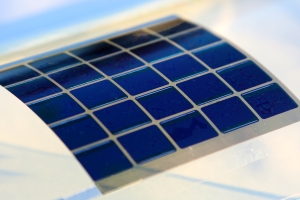Future solar cells will be light and mechanically flexible. They will be produced at low costs with the help of printing processes. POPUP, the new BMBF-funded research project, aims at developing more efficient materials and new architectures for organic photovoltaic devices. An interdisciplinary team headed by Dr. Alexander Colsmann of the KIT Light Technology Institute (LTI) works on improving the basic understanding and developing new architectures for semitransparent and non-transparent solar cells and modules.
Ten leading universities, research institutions, and companies in various areas are involved in the project “Development of New Materials and Device Structures for Competitive Mass Production Methods and Applications of Organic Photovoltaics” (POPUP). The project is coordinated by the pharmaceutical and chemical company of Merck. The total budget of the three year project is EUR 16 million. The Federal Ministry of Education and Research (BMBF) funds EUR 8.2 million, the remainder is borne by the companies involved in the project. For its contribution to the research project, KIT is granted funding in the amount of EUR 1 million.
POPUP is to leverage organic photovoltaics. For this purpose, the consortium intends to develop more efficient and more stable materials for low-cost, industrially applicable printing and coating methods as well as new architectures for flexible and rigid, semitransparent and non-transparent solar modules. The tasks of KIT in this project comprise developing in-depth understanding and studying new component architectures for semi-transparent and non-transparent solar cells and modules in close collaboration with the industry partners.
Depending on the application, solar cells are manufactured on flexible plastic foils or rigid glass carriers. In the area of organic photovoltaics, KIT scientists work on two objectives, namely, full printability of solar cells and replacing indium tin oxide (ITO) as the electrode material. Instead, the scientists use conductive and transparent foils for flexible carriers. For glass carriers, they study the deposition of transparent electrodes from metallic microstructures and conductive buffer layers. In addition, the KIT team studies highly efficient semi-transparent solar cells in mini-modules made of organic semiconductors. Hence, KIT research concentrates on one of the key technologies of organic photovoltaics.
In the medium and long term, the industry partners plan to manufacture organic solar modules by competitive mass production methods. Later on, the solar modules are planned to be integrated into vehicles for electricity supply to onboard electronics, in buildings and glass facades, for energy supply of free-standing buildings and devices, emergency systems, transport and navigation aids. The novel technologies will also be used for off-grid electricity supply in the leisure activity sector or for charging mobile consumer devices. The results obtained by the KIT researchers will have direct impact on various applications.
The POPUP consortium comprises ten partners who have many years of experience in the organic photovoltaics field and are technology leaders in their respective areas of work: Merck, Darmstadt; Center for Applied Energy Systems, Erlangen; PolyIC GmbH & Co. KG, Fürth; Karlsruhe Institute of Technology, Karlsruhe; Leonhard Kurz Stiftung & Co. KG, Fürth; Belectric OPV GmbH, Nuremberg; Webasto Group, Stockdorf; Siemens AG, Erlangen; Centrosolar Glas GmbH & Co. KG, Fürth; Center for Solar Energy and Hydrogen Research, Stuttgart. The companies, universities and institutes are cooperating along a cross-sectoral and multidisciplinary value chain characterized by the division of labor.
The research topics of the BMBF POPUP project are thematically linked to the BMBF funding program known as "Basic Research Energy 2020+". POPUP specifically supports the implementation of the high-tech strategy of the German federal government.
Karlsruhe Institute of Technology (KIT) is one of Europe’s leading energy research establishments. Research, education, and innovation at KIT foster the energy turnaround and reorganization of the energy system in Germany. For this, KIT links excellent competences in engineering and science with know-how in economics, the humanities, and social science as well as law. The activities of the KIT Energy Center are organized in seven topics: Energy conversion, renewable energies, energy storage and distribution, efficient energy use, fusion technology, nuclear power and safety, and energy systems analysis. Clear priorities lie in the areas of energy efficiency and renewable energies, energy storage technologies and grids, electric mobility, and enhanced international cooperation in research.
In close partnership with society, KIT develops solutions for urgent challenges – from climate change, energy transition and sustainable use of natural resources to artificial intelligence, sovereignty and an aging population. As The University in the Helmholtz Association, KIT unites scientific excellence from insight to application-driven research under one roof – and is thus in a unique position to drive this transformation. As a University of Excellence, KIT offers its more than 10,000 employees and 22,800 students outstanding opportunities to shape a sustainable and resilient future. KIT – Science for Impact.

